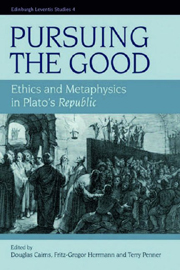Book contents
- Frontmatter
- Contents
- Preface
- Contributors and Editors
- Introduction
- 1 What is the Form of the Good the Form of? A Question about the Plot of the Republic
- 2 Glaucon's Challenge, Rational Egoism and Ordinary Morality
- 3 Thrasymachean Rulers, Altruistic Rulers and Socratic Rulers
- 4 Neutralism in Book I of the Republic
- 5 The Good, Advantage, Happiness and the Form of the Good: How Continuous with Socratic Ethics is Platonic Ethics?
- 6 The Form of the Good and the Good in Plato's Republic
- 7 Flourishing: The Central Concept of Practical Thought
- 8 Is Plato's Conception of the Form of the Good Contradictory?
- 9 The Good, Essences and Relations
- 10 The Idea of the Good and the Other Forms in Plato's Republic
- 11 The Aporia in the Charmides about Reflexive Knowledge and the Contribution to its Solution in the Sun Analogy of the Republic
- 12 The Good and Mathematics
- 13 The Good and Order: Does the Republic Display an Analogy Between a Science of Ethics and Mathematics?
- 14 Inquiry and Justification in the Search for the Highest Good in Plato and Aristotle
- 15 The Carpenter and the Good
- 16 Conversion or Conversation? A Note on Plato's Philosophical Methods
- Index
9 - The Good, Essences and Relations
Published online by Cambridge University Press: 12 September 2012
- Frontmatter
- Contents
- Preface
- Contributors and Editors
- Introduction
- 1 What is the Form of the Good the Form of? A Question about the Plot of the Republic
- 2 Glaucon's Challenge, Rational Egoism and Ordinary Morality
- 3 Thrasymachean Rulers, Altruistic Rulers and Socratic Rulers
- 4 Neutralism in Book I of the Republic
- 5 The Good, Advantage, Happiness and the Form of the Good: How Continuous with Socratic Ethics is Platonic Ethics?
- 6 The Form of the Good and the Good in Plato's Republic
- 7 Flourishing: The Central Concept of Practical Thought
- 8 Is Plato's Conception of the Form of the Good Contradictory?
- 9 The Good, Essences and Relations
- 10 The Idea of the Good and the Other Forms in Plato's Republic
- 11 The Aporia in the Charmides about Reflexive Knowledge and the Contribution to its Solution in the Sun Analogy of the Republic
- 12 The Good and Mathematics
- 13 The Good and Order: Does the Republic Display an Analogy Between a Science of Ethics and Mathematics?
- 14 Inquiry and Justification in the Search for the Highest Good in Plato and Aristotle
- 15 The Carpenter and the Good
- 16 Conversion or Conversation? A Note on Plato's Philosophical Methods
- Index
Summary
I sympathise with many of Gerhard Seel's claims in his chapter, particularly about the practical significance of the Good and about how it can have effects in the sensible world; and I am attracted by his view of what sort of thing the Form of the Good is; so my response will be largely concerned with some points of detail. I want to raise a number of questions about the steps by which Seel reaches his conclusion.
THE METHOD OF DIALECTIC
Seel says (p. 178) that most scholars agree that the method of dialectic discussed in the Republic is the same as the method of collection and division expounded in the Phaedrus and other dialogues, which constructs a system of genera and species, and aims at definition of each item, by locating it within this structure. However, there is a long tradition among Anglo-American scholars of rejecting this identification. This tradition was initiated by Richard Robinson, who points out that the discussion in the Republic makes no mention of genera and species, while conversely the discussions in the Phaedrus and elsewhere make no mention of hypotheses and the search for a first principle. Indeed, it is often held that the method of collection and division is introduced for the first time in the Phaedrus, which is standardly dated later than the Republic, and that it is meant in some way to replace the method discussed there; and sometimes that it depends on a view of communion of Forms which is not present in the Republic.
- Type
- Chapter
- Information
- Pursuing the GoodEthics and Metaphysics in Plato's Republic, pp. 197 - 201Publisher: Edinburgh University PressPrint publication year: 2007



